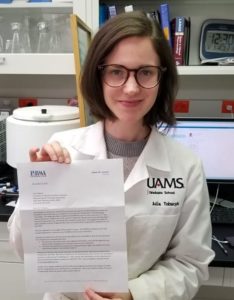PTET Track Overview

The PTET Track is designed to offer Ph.D. students a broad-based education to prepare for a career in translational research within academia, industry, or government. Our program emphasizes identifying mechanisms of disease as a basis for identifying new drug targets and evaluating potential medications in vivo as the first step to medication development. The PTET Track within GPIBS includes 53 faculty in the basic science and clinical departments in the College of Medicine, and faculty in the Colleges of Pharmacy and Public Health. Training sites include the UAMS campus, the Arkansas Children’s Research Institute (ACRI) and the FDA National Center for Toxicological Research (NCTR). Our faculty have a long history of graduate research training focused on pharmacology and toxicology in diverse specialties including behavioral and substance abuse, cardiovascular and renal disease, cancer and carcinogenesis, and ischemic neurological disorders and retinal injury.
Graduate students have trained at NCTR, and 13 researchers there have adjunct appointments at UAMS through the Department of Pharmacology and Toxicology. A recent Memorandum of Understanding (MOU) between the State of Arkansas and the FDA has made collaborations in graduate education between UAMS and NCTR even easier.
Download our brochure (PDF).
Program of Study
Students complete a core curriculum in Semester 1, join the PTET track in Semester 2, and complete the curriculum outlined below. At the end of Year 2, students will take a candidacy exam that includes a written and oral component to officially be a candidate for the doctoral degree. Students will then continue work with their research mentor. Their research project must be defended in a written and oral format prior to awarding of the doctoral degree. All of our students currently receive a $35,000 yearly stipend and we pay tuition!
GPIBS Ph.D. Core Curriculum
Year 1 Fall
(12 credit hours)
1 credit hour Seminar (IBSD 5110V)
1 credit hour Scientific Communication and Ethics I (PHAR 51171)
3 credit hours Biochemistry & Molecular Biology (BIOC 51033)
3 credit hours Cell Biology (NBDS 51033)
3 credit hours Gene Expression (PHYO 51093)
1 credit hour GPIBS Research (IBSD 5100V)
Track-Specific Course Requirements
Year 1 Spring
(10 credit hours)
1 credit hour Seminar (PHAR 51091)
1 credit hour Scientific Communication and Ethics II (PHAR 51191)
3 credit hours Principles and Methods of Pharmacology and Toxicology (PHAR 51053)
3 credit hours General Physiology (PHYO 5103)
1 credit hour Recent Advances in Pharmacology and Toxicology (PHAR 51151)
1 credit hour Research (PHAR 51031)
Year 1 Summer
(1 credit hour)
1 credit hour Research (PHAR 51031)
Year 2 Fall
(10 credit hours)
1 credit hour Seminar (PHAR 51091)
3 credit hours Graduate Pharmacology and Therapeutics (PHAR 51073)
1 credit hour Scientific Communication and Ethics III (PHAR 51201)
3 credit hours Experimental Design and Quantitative Analysis (PHAR 51433)
1 credit hour Recent Advances in Pharmacology and Toxicology (PHAR 51151)
1 credit hour Research (PHAR 51031)
Year 2 Spring
(10 credit hours)
1 credit hour Seminar (PHAR 51091)
1 credit hour Scientific Communications and Ethics IV (PHAR 51231)
3 credit hours Elective (choose to take in Fall or Spring of second year)*
3 credit hours Elective (choose to take in Fall or Spring of second year)*
1 credit hour Recent Advances in Pharmacology and Toxicology (PHAR 51151)
1 or 4 credit hours Research (based on taking elective or not) (PHAR 51031)
*The elective must include three additional course credit hours based on advice from the student’s mentor and/or advisory committee. Clinical Toxicology (PHAR 61033), Neuropharmacology (PHAR 51133) or Systems Therapeutics (PHAR 61003) are highly encouraged.
Year 2 Summer
(1 credit hour)
1 credit hour Research (PHAR 51031)
Candidacy Exam (research proposal submitted to committee followed by oral defense)
Year 3 Fall
(10 credit hours)
1 credit hour Seminar (PHAR 51091)
1 credit hour Recent Advances in Pharmacology and Toxicology (PHAR 51151)
8 credit hours Dissertation Research (PHAR 51241)
Year 3 Spring
(10 credit hours)
1 credit hour Seminar (PHAR 51091)
1 credit hour Recent Advances in Pharmacology and Toxicology (PHAR 51151)
8 credit hours Dissertation Research (PHAR 51241)
Year 3 Summer
(1 credit hour)
1 credit hour Dissertation Research (PHAR 51241)
Year 4 Fall
(10 credit hours)
1 credit hour Seminar (PHAR 51091)
1 credit hour Recent Advances in Pharmacology and Toxicology (PHAR 51151)
8 credit hours Dissertation Research (PHAR 51241)
Year 4 Spring
(10 credit hours)
1 credit hour Seminar (PCOL 5109)
9 credit hours Dissertation Research (PHAR 51241)
Year 4 Summer
(1 credit hour)
1 credit hour Dissertation Research (PHAR 51241)
Degree Completion
Students must successfully defend their research project in written and oral format prior to completion of the degree.
| Credit Hour Summary | PTET Totals |
| Credit hours of didactic coursework (minimum of 24): | 45 |
| Credit hours of research prior to passing qualifying exam (no minimum): | 6 |
| Credit hours of dissertation research (minimum of 18): | 35 |
| Total number of credit hours (minimum 72): | 86 |
Note: This credit hour summary assumes that students on average take four years to complete their degree. It is certainly possible
students could take more than four years, and thus the number of seminar and dissertation hours would increase relative to that
presented.
Graduate Certificate in Regulatory Sciences
Pharmacology/Toxicology students can also opt to take courses geared toward earning a Certificate in Regulatory Science (offered through the College of Public Health/Dept. of Environmental and Occupational Health). The Graduate Certificate in Regulatory Science consists of 12 semester credit hours with courses in current regulatory statutes, safety assessment, clinical trials design and management, and data quality requirements for regulatory decision-making. Please speak to the program directors or refer to the College of Public Health website for more about this program.
Contact Us
PTET Track Director
Paul Prather, Ph.D.
Email: pratherpaull@uams.edu
Phone: 501-686-5512
